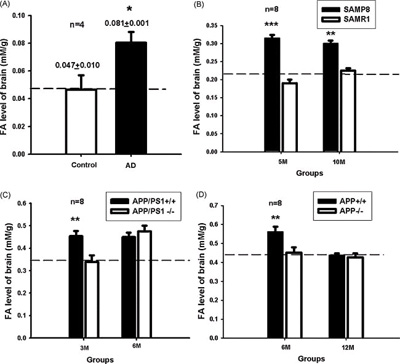Senile dementia, for instance those related to Alzheimer's disease (AD), is the most common form of dementia. The presence of amyloid-containing senile plaques together with neurofibrillary tangles has been shown in many investigations to be hallmarks of Alzheimer's disease. It is widely known that exogenous formaldehyde exposure induces human cognitive impairment and animal memory loss; and recent studies show that formaldehyde at pathological levels induces Aβ deposition and misfolding of Tau protein to form globular amyloid-like aggregates. Endogenous formaldehyde may be a marker for progressive senile dementia. A recent study shows that urine formaldehyde level is inversely correlated to mini mental state examination scores in senile dementia. The study suggests that cognitive impairments for the senile dementia are probably related to endogenous formaldehyde levels; and the mini mental state examination scores referred to the evaluation of urine formaldehyde level in dementia patients may be used as a non-invasive method for the investigation and diagnosis of senile dementia.
This work was published in the Neurobiology of Aging magazine (2011,32(1):31-41) and was carried out byProfessor Rongqiao He from the Institute of Biophysics of Chinese Academy of Sciences and his colleagues from Beijing Hospital for the Elderly, Institute of Psychology of CAS, University of Science and Technology of China, Shantou University Medical College and Peking University.

Fig. 3
Formaldehyde levels in the autopsy hippocampus from AD patients and the brains of AD-like animal models. (A) The autopsy hippocampus of AD patients and healthy controls. (B) SAMP8 mice at 5 and 10 months old and SAMP1 mice at age-matched. (C) APP-transgenic mice at 6 and 12 months old and controls. (D) APP/PS1-transgenic mice at 3 and 6 months old and controls. *p <
< 0.05; **p
0.05; **p <
< 0.01; ***p
0.01; ***p <
< 0.001.(© 2009 Elsevier Inc. )
0.001.(© 2009 Elsevier Inc. )